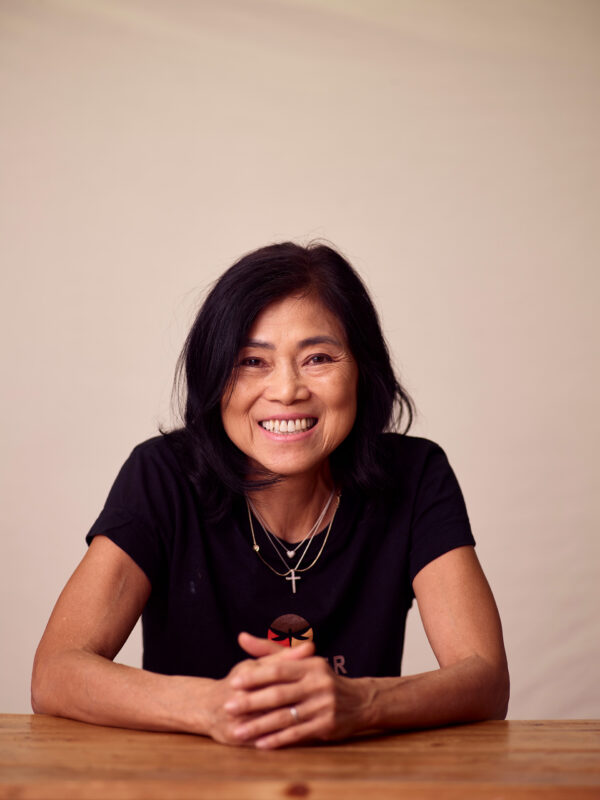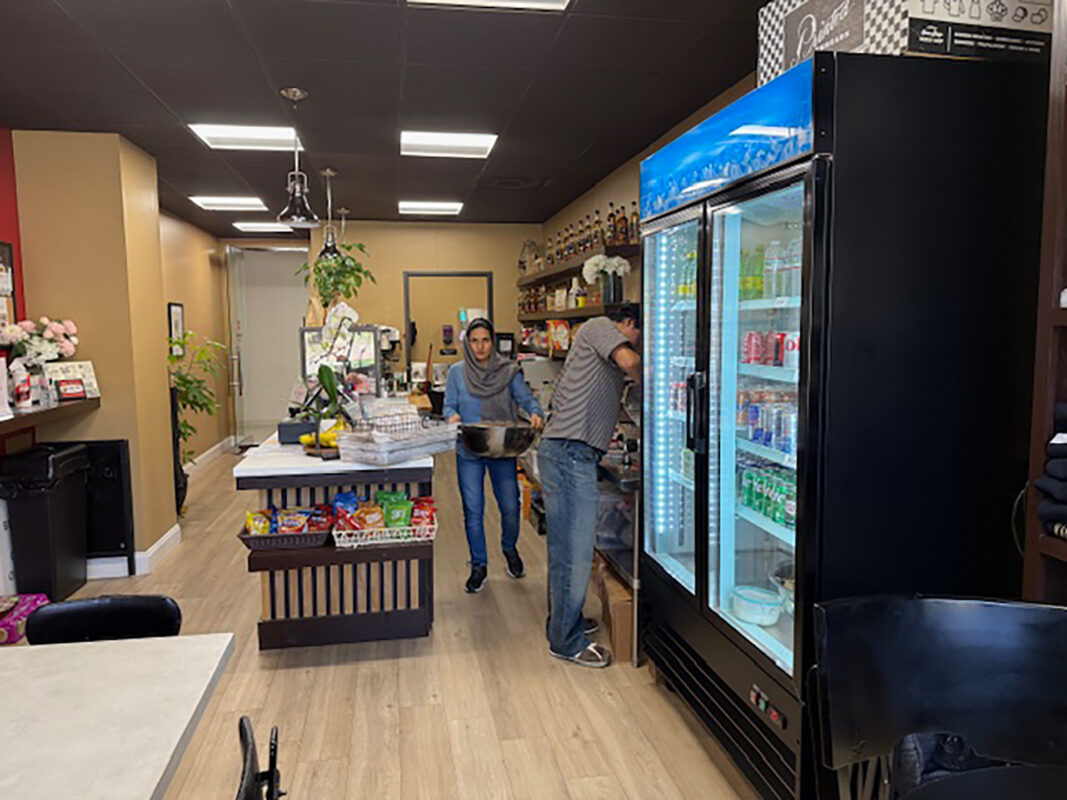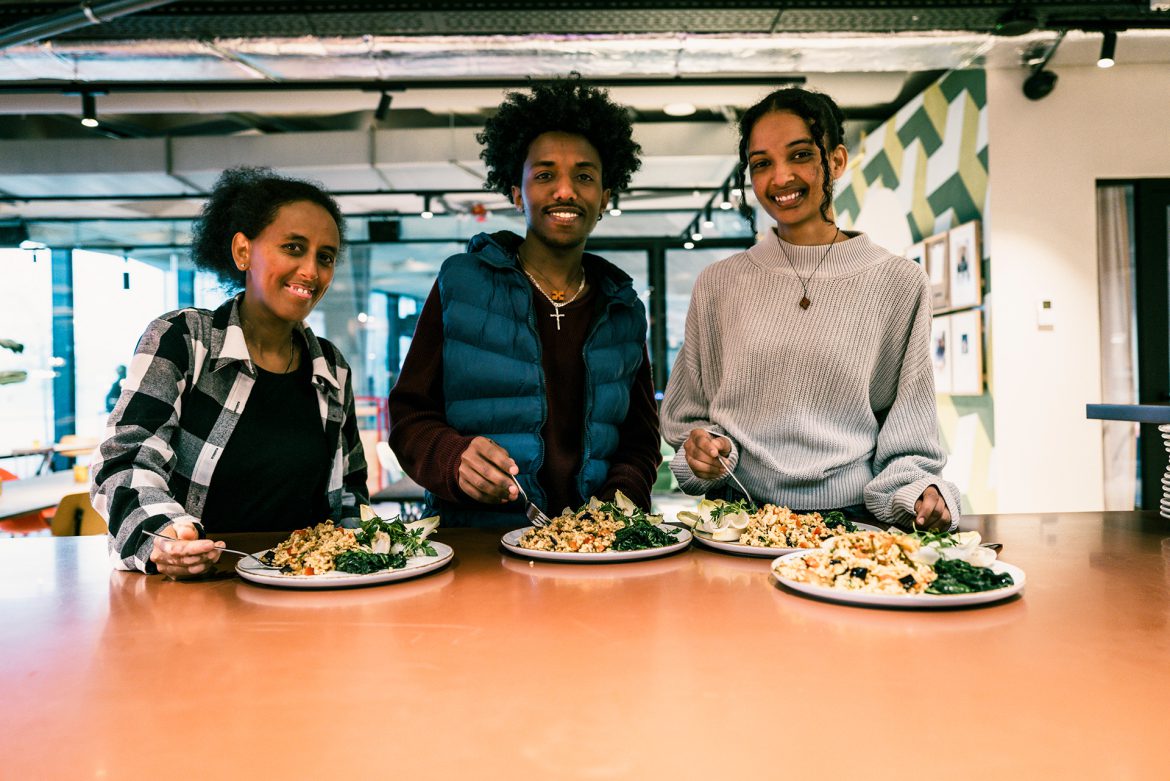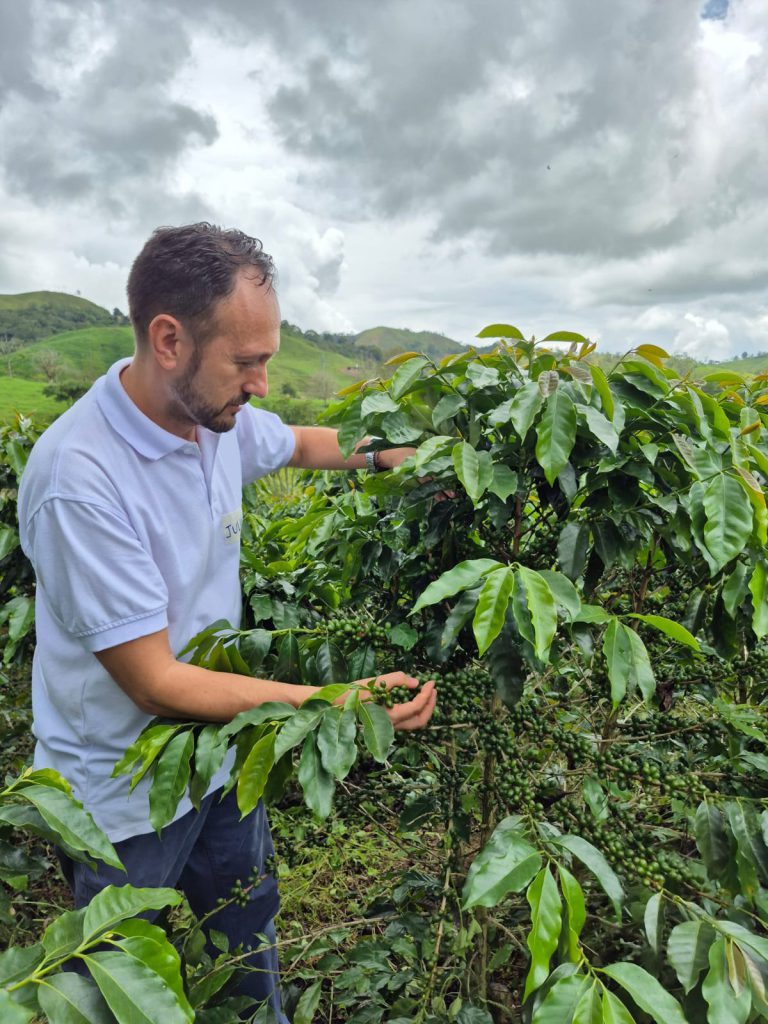Learning how to steam milk and navigate a point-of-sales system, whilst keeping up a conversation with a customer, is a delicate juggling act. Throw in navigating a new country’s laws—possibly in an unfamiliar language—and having little socioeconomic capital? Everything is augmented in difficulty.
For many refugees and asylum seekers, hospitality jobs are accessible because they’re often entry-level and don’t have stringent qualifications, valuing experience over education.
I checked in with four coffee companies around the world that offer hospitality and barista training for refugees and asylum seekers. Support for these groups extends far beyond job opportunities: all the organizations also incorporate some combination of learning the local language, providing a safe work environment, and helping navigate complex government systems.
“Coffee training is really like a tactic or a bridge,” says Ravi Prasad, founder of the social enterprise Parliament on King in Erskineville, New South Wales, Australia. “It gets a lot of people into the cafe, out of their problems in life, and into a situation where they’re talking and working with other people.”
Parliament on King’s space is multifunctional: a cafe, bookshop, event space, and community dinner venue. It offers a pay-to-train model where refugees are paid to train as chefs and subsequently cater the food to companies or serve community dinners. Program participants are primarily women who are familiar with cooking and serving large family meals. Prasad explains, “The idea is to increase the efficiency of their work in the kitchen to a point where it is a commercially valuable skillset without compromising on the integrity of their home cuisines.”
The cafe’s impact is more than physical: it’s a true display of what happens when you create a supportive community ecosystem, prompting ideas throughout the 11 years of operation, like “pay what you can” coffee, a weekly soup kitchen with dedicated volunteers, and “The Tinder Door” with Polaroids for single regulars. Prasad believes that the model works “because we create an opportunity for other people to act upon the goodwill in their hearts and do good themselves.”
As a testament to the community trust it has built, and regarding their chefs from Palestine and Gaza who came from active war zones, he says, “I found that issues that seem so divisive politically and socially don’t bear fruit within the environment of what we are doing.” Prasad’s space is a soft landing pad that provides stability while people work on qualifying in their fields or segue into hospitality work. He points to examples like a civil engineer from Gaza who wanted to connect with her community while job searching and a Palestinian medical doctor who needed to support herself while qualifying to practice in Australia.
“They want to build new and better lives. They want to contribute to their new communities. So you’re working with people who are committed to overcoming any of the challenges,” he adds. “As are we.”
Displacement, in the people sense, is the movement of people from their homes because of circumstances outside their control, such as violence, war, political instability, and fear of persecution. Displacement statistics are divided into four categories: refugees, internally displaced people (within a country), asylum-seekers, and those in need of international protection. According to the United Nations High Commissioner for Refugees (UNHCR or UN Refugee Agency), by the end of April this year, the equivalent of Japan’s population—seventh in the world at 122 million—were displaced. Of that total, 42.7 million were refugees—just over the population of Yemen, the birthplace of coffee. In short, as many as 1 in 200 people in the world are refugees.
The UNHCR is the guardian of the 1951 Convention and the 1967 Protocol, together outlining who a refugee is, the kind of protection they need, the rights they are entitled to receive, and the legal obligations of signed States (currently at 149 States).
Despite damaging and inaccurate narratives shaping refugees as job stealers and freeloaders, they are, in fact, exceptionally hardworking and determined to succeed, especially since their origin location is not an option to return to. Much like in immigration advocacy, refugee success stories are often trotted out as if to prove, see, refugees contribute to society, too.
In the book The Ungrateful Refugee: What Immigrants Never Tell You, author Dina Nayeri writes candidly about the obstacles surrounding the refugee experience. She describes neatly packaging her refugee story for asylum interviews and the expectation of selling it to others: “Then, after asylum was secured, we had to relive that story again and again, to earn our place, to calm casual skeptics. Every day of her new life, the refugee is asked to differentiate herself from the opportunist, the economic migrant.”
Someone once asked me in an interview a relatively benign question of why people should care about coffee workers’ wages, and I had the unhelpful response of “I don’t know how to say you should care about people as people.” And I feel like that applies here, too.

At age 13, Jane Nguyen Gow entered the US with her family as a refugee from Vietnam. She recalls getting in fights and receiving a lot of hate, which she believes stemmed from a fear of the bullies not knowing anything about refugees. After a few successful decades in IT, she founded the BeKinder Coffee non-profit organization in Dallas, Texas, in 2019. For her, it’s a labor of love—she does not draw a paycheck and often supports programs and individuals with her own savings. BeKinder currently operates a catering business, cafe, wholesale program, and a home garage roastery—small batches on an eight-pound capacity Buckeye BC8—with hopes of securing a roasting space in the near future.
Gow also primarily works with women, starting them first in the kitchen with baker training. Once that training is complete, they move on to barista work. Oftentimes, English learning is concurrent with their training. She notes the transformation that happens within three months: “They completely change in their demeanor. They are happier, they talk more, they look you in the eyes, and you just feel that they’re getting lighter and lighter.”
In the past, Gow worked with the Refugee Service of Texas (RST), the US branch of the International Rescue Committee (IRC), and Catholic Charities. RST was closed after resettling a large number of Afghan refugees challenged its budget (Gow observes, “That fall of Saigon and the way that the US abandoned Vietnam is exactly the same way that the US abandoned Afghanistan.”) and the IRC US branch has been severely affected by the Trump administration.

The US Refugee Admissions Program (USRAP) was suspended on January 20, 2025 by executive order, and USAID funding to resettlement agencies was cut. Multiple lawsuits are pending. Between 2005 and 2019, the net fiscal impact of US refugees and asylees was $123 billion, while a study found that even a 10% reduction in refugee settlement could result in a $1.4 billion loss to the US economy. Fortunately, BeKinder has been minimally affected, as its retail arm’s sales are reinvested in the nonprofit.
BeKinder Coffee is not the only US organization offering refugee training programs. Others include 1951 Coffee in California, Arboretum Coffee in Colorado, and Neighborhood Coffee Roasters in North Carolina.

Over in the UK, NEMI Teas was created after CEO Pranav Chopra—also a migrant himself—learned that many refugees face significant hurdles to employment, even after being granted the right to work in the country. When it lost 90% of its revenue to the pandemic, Nemi pivoted in 2022 to include a retail cafe, recognizing a skilled labor gap in the UK hospitality market.
Its two TRAMPOLINE Cafe locations offer a 10-week comprehensive training and employment program, which he emphasizes is vital to supporting refugees and asylum seekers, “It’s crucial because it addresses the non-vocational barriers that can prevent refugees from successfully integrating and thriving in their new communities.” Nemi provides a safe environment for practicing English, building confidence, and also serves as a local job reference.
As a social enterprise, Chopra notes that there’s the inherent challenge of balancing its social mission with commercial growth. To drive greater impact and create more job opportunities, the enterprise must grow and secure larger contracts. Nemi recently expanded its operations and doubled its team, offering a new 3-day intensive “Bounce program” for asylum seekers. “Seeing participants move on to full-time employment and education is a powerful testament to our work and a major source of motivation,” says Chopra. “We are driven by the desire to tackle inequality and provide equal opportunities.”

In the Netherlands, where Refugee Company is based, the country hosted over 260,000 refugees by the end of 2024. About its name, the word “Refugee” is symbolically crossed out “because ‘refugee’ is not an identity, but a temporary phase in someone’s life.”
The Public Benefit Organisation (designated by the Dutch Tax Administration) oversees the operation of social enterprises A Beautiful Mess and Mondmaskerfabriek. Last interviewed in 2018 by Sprudge, a lot has happened since then: one restaurant closure, two new restaurants, and four Community Cafés (all four are located in or near asylum seeker centers). In 2020, Refugee Company had just opened two new restaurants when the pandemic shutdowns happened. Undeterred, the organization opened a face mask factory, allowing it to continue offering the Re-Start program and provide paid jobs.
Refugee Company has two programs that cover all parts of the refugee journey, focusing on four essentials, explains operational director Debora Timmerman. “Talent, network, resilience, and language. These are the building blocks for social and financial independence.” The Pre-Start program introduces people from the asylum seekers’ center to the community and offers catering and hospitality training. The Re-Start program is a six-month to three-year work-study program that includes job skills training, interview preparation, psychosocial support, language courses, dedicated coaches for job placement, and more. After signing their first contract, participants are supported for another six months. Pre-Start has seen 300 people complete the program, and Re-Start has seen 900 participants.

Despite the current political climate and anti-immigration and anti-migrant rhetoric ricocheting around the world, all four organizations are hopeful for the future and remain steadfast in their commitment to helping refugees and asylum seekers thrive. Timmerman notes: “The current political headwinds around asylum are very challenging for our participants. At the same time, it motivates us even more to continue, because now more than ever it’s important to create safe and welcoming spaces where people with a refugee background can feel at ease, connect with others, and work toward their future.”
There are many ways to support programs like the ones highlighted here, including partnering for job opportunities, hiring for catering services, purchasing retail items, making monetary donations, and volunteering your time, such as participating in language practice conversations.
Beyond coffee skills training, Chopra emphasizes the importance of other forms of support. These kinds of programs succeed when there’s also holistic support, like mental health and financial literacy. “These programs are not just about a job; they are about empowerment and a pathway to a new life.”
Jenn Chen (@thejennchen) is an Editor At Large at Sprudge Media Network. Read more Jenn Chen on Sprudge.




